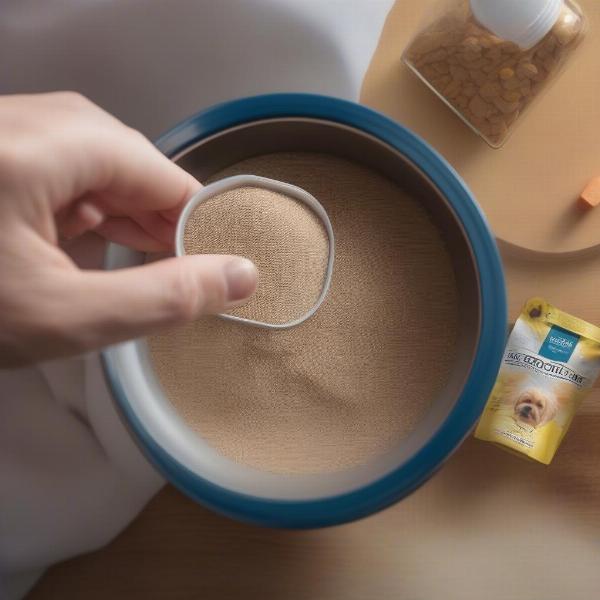Powder for dogs encompasses a range of products, from nutritional supplements to flea and tick preventatives, and even grooming aids. Understanding the different types of powders available and how to use them safely and effectively is crucial for every dog owner. This guide will explore the various uses of powder for dogs, outlining the benefits and potential risks, and providing practical advice for incorporating these products into your dog’s care routine.
Types of Powders for Dogs and Their Uses
Several types of powders are available for dogs, each serving a specific purpose. Let’s delve into the most common ones:
Nutritional Supplements in Powder Form
Many essential vitamins and minerals can be supplemented through powders added to your dog’s food. These can be especially beneficial for picky eaters or dogs with specific dietary needs.  Nutritional Supplement Powder for Dogs
Nutritional Supplement Powder for Dogs
Flea and Tick Powders
These powders work by disrupting the life cycle of fleas and ticks, preventing infestations and protecting your dog from these pesky parasites. However, it’s crucial to choose a product that is safe for your dog’s age and breed and to follow the application instructions carefully.
Grooming Powders
Grooming powders can help absorb excess oil and dirt, leaving your dog’s coat looking and smelling fresh. These are particularly useful for dogs with oily skin or those who are prone to shedding.
Medicated Powders
Certain skin conditions, such as hot spots or fungal infections, can be treated with medicated powders. These powders typically contain antifungal or antibacterial agents that help soothe irritated skin and promote healing. It’s essential to consult with a veterinarian before using any medicated powder on your dog.
Choosing the Right Powder for Your Dog
Selecting the appropriate powder for your dog depends on their individual needs. Consider factors such as age, breed, health conditions, and lifestyle when making your decision.
What to Consider When Choosing
- Age: Puppies and senior dogs may have different needs than adult dogs.
- Breed: Certain breeds are predisposed to specific skin conditions and may benefit from specialized powders.
- Health Conditions: Always consult your veterinarian before using any powder on a dog with underlying health issues.
- Lifestyle: An active dog may require different grooming powders than a less active dog.
Applying Powder to Your Dog Safely
Always follow the manufacturer’s instructions carefully when applying any powder to your dog. Avoid getting the powder in your dog’s eyes, nose, or mouth. If using a flea and tick powder, ensure your dog doesn’t lick or ingest the product.
Potential Risks and Side Effects
While generally safe when used correctly, some powders can cause side effects in certain dogs. These can include skin irritation, allergic reactions, or gastrointestinal upset. If you notice any adverse reactions, discontinue use and consult your veterinarian.
When to Consult a Vet
If you are unsure about which powder is right for your dog or if you notice any unusual symptoms after using a powder, it’s always best to consult with your veterinarian. They can provide personalized advice and help ensure your dog’s safety and well-being.
Conclusion
Powders for dogs can be valuable tools for maintaining their health, hygiene, and overall well-being. From nutritional supplements to grooming aids and medicated treatments, understanding the various types and their proper application is essential for responsible dog ownership. By carefully considering your dog’s individual needs and consulting with your veterinarian when necessary, you can ensure you’re making informed decisions about using powders as part of their care.
FAQ
- Are all dog powders safe for all breeds? No, some breeds may be more sensitive to certain ingredients. Always check the product label and consult with your vet.
- Can I use human powder on my dog? No, human powders may contain ingredients that are harmful to dogs.
- How often should I use grooming powder on my dog? This depends on your dog’s breed and coat type. Consult the product label or your groomer.
- What should I do if my dog ingests flea and tick powder? Contact your veterinarian immediately.
- Can I use medicated powder and flea and tick powder at the same time? Consult your veterinarian before combining products.
- Are there natural alternatives to chemical-based powders? Yes, some natural powders are available, such as diatomaceous earth for flea and tick control.
- How should I store dog powders? Store in a cool, dry place away from direct sunlight.
ILM Dog is your go-to resource for expert advice on all aspects of dog care, from breed selection and health to training and nutrition. We offer a wealth of information to help you provide the best possible care for your canine companion. Explore our articles on cute dog accessories and discover the latest trends in pet care. For personalized guidance, contact our team of experts at [email protected] or call us at +44 20-3965-8624. ILM Dog is dedicated to helping you build a strong, healthy, and happy relationship with your furry friend.